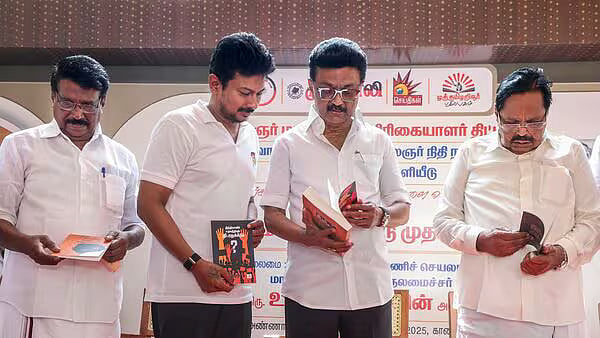Tamil Nadu Charts A Different Path
In 2006, Tamil Nadu also passed the Tamil Learning Act, mandating the language as a subject in all school boards in the state.

Tamil Nadu Charts A Different Path | X/@Udhaystalin
Tamil Nadu’s State Education Policy 2025 is as much a firm assertion of federalism as it is a framework for much-needed reforms to school curricula, skill building and student development for a new age. Historically a torchbearer for linguistic rights, the state has championed the study of two languages in schools with a strong emphasis on English and vehemently opposed the three-language formula that includes Hindi. In 2006, Tamil Nadu also passed the Tamil Learning Act, mandating the language as a subject in all school boards in the state. The DMK government’s move to formulate a distinct SEP for schools was initiated in 2022 with the setting up of the Justice D. Murugesan Committee in the wake of the sharpening divide over Hindi imposition in several states and the Union government’s strong support for the three-language formula in the National Education Policy 2020. Beyond the language issue, however, Tamil Nadu has produced a document that can truly advance the prospects of students in the state if its progressive features are implemented with determination. Chief among these is the raising of academic attainments. These are currently below par, with serious deficits in mathematics, language, science and social science in grades 3, 6 and 9 in government and aided institutions identified by the State Level Achievement Survey 2024. This state-specific finding is similar to assessments made by other agencies, such as the National Achievement Survey and the Annual Status of Education Report. Remedies proposed in Tamil Nadu’s SEP, such as curriculum redesign, more experiential learning, deeper conceptual understanding and better assessment techniques, have the potential to improve outcomes.
ALSO READ
Education reform remains a work in progress in India over the decades, and successive governments have tinkered with the system without achieving a radical transformation. As the Nobel laureate Amartya Sen pointed out, even the NEP 2020 did not guarantee universal and free public schooling. Unsurprisingly, India fares poorly in the global ranking of schooling outcomes, and its abysmal position prompted it to withdraw from the Programme for International Student Assessment in 2009; China, Singapore and South Korea score high in this assessment. Within the overall unimpressive record, southern states led by Kerala and Tamil Nadu have fared comparatively better, and the social recognition enjoyed by education has spurred them to undertake reforms. As the SEP recognises, deepening equity in education, especially for SC, ST, remote area, disabled and girl students, continues to demand more effective interventions in the form of scholarships, hostels and barrier-free environments. The emphasis on building future skills and familiarising school students with artificial intelligence, climate change and collaborative working promises to give them an edge. As a prosperous state, Tamil Nadu is better placed to devote the resources needed to make school education better. It must encourage philanthropists and institutions to open more government-aided schools in pursuit of its goal of excellence.
RECENT STORIES
-
-
-
-
-